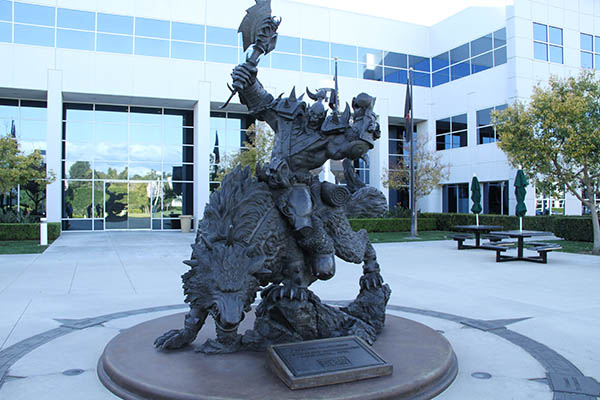I spend an inordinate amount of time watching the news, blogs, and social media that swirls around what can at best be vaguely called “the videogame industry.” There are multiple industries, markets, cultures, interests and to pretend that it is a kind of unified monolithic industry doesn’t really seem to fit much an more (if it ever did). Yet, many CASTAC readers and authors are interested in structure. Why do particular socio-cultural-political-economic formations persist remains an important question that seems to cut across the interests of CASTAC readers.

Image: Blizzard Entertainment HQ statue by Gordon Tarpley. Licensed under CC BY 2.0 via Commons.
For context, Activision, one of the already largest videogame publishers, announced on Tuesday their acquisition of King, a developer and publisher of popular web-based and mobile-based “free to play” (F2P) games. To put this in context:
The giant company’s acquisition of King is the biggest merger in gaming since the combination of Activision and Blizzard in a nearly $19 billion deal in 2007, and it cements the new publisher as one of the biggest players in every gaming platform—home consoles like the PlayStation 4, PC online games like World of Warcraft, and mobile.
So, what is the relevance of a $5.9B between one of the largest videogame publishers and a leading developer/publisher of social games, King for CASTAC readers? On the one hand, I’d argue that at face value, that occurrences like these teach us important things about large-scale global capitalism, or that simply it matters as much as typical matters of international concern:
“This is huge. It creates the biggest games powerhouse in the Western world, only second to Tencent on a global scale,” said Peter Warman, the chief executive and game analyst at market researcher Newzoo. “With game publishers becoming true cross-screen and transmedia companies, this is a huge move and gives Activision Blizzard a unique reach across all screens on a global scale.”
I originally justified my research as relevant or mattering because the study of games and game development was “indexical” of work, work organization, and our current economic context. More recently, I’ve transitioned that towards saying that games matter just like any other large corporate maneuver. The fact that entertainment, games, or play are part of the equation cannot be used to exclude them from our conversations about these games. And perhaps, as Ian Bogost notes, this is simply a game company playing an already relatively broken game of global capitalism:
The fiscal implications of the deal are a reminder that businesses are financial instruments as much as or more than they are providers of goods and services. In the case of digital entertainment, companies like Activision Blizzard and King Digital speculate on the public’s current and future interest in digital-entertainment trends. Whether or not Candy Crush sticks around might be less important to Activision than capitalizing on it before it falls out of favor.
…
It’s fitting to consider these bigger dynamics in relation to a game that is itself about financial speculation. Candy Crush Saga is a free-to-play game; you download it for nothing, and then the game invites you to spend money on bonuses to make it easier. Back in 2013, King acknowledged that at least 70 percent of its players never spent a dime on in-app purchases. To play King’s flagship game is to attempt to get the most benefit for the least financial outlay. And that’s just what Activision has done.
This is certainly part of what is at play in the game being played. However, I think this is actually a much older game, one that has been played by media corporations for much longer. A game that was once played by CBS and NBC. It became the battle waged by Comcast and AT&T, it is the battle for the largest possible number of eyeballs. It is a game that Facebook and Twitter play. One that Fox Entertainment Group and NBC Universal play. Yet, here we now have a single organization with the ability to reach 81.4 million Americans and a massive global reach playing the game and likely in different ways from their competitors. Perhaps most importantly, this is a play about the increasing role that data-driven design, analytics, and big-data will play in global media production. Activision not only acquired eyeballs in this exchange, they captured knowledge about making money in a domain where it is increasingly difficult to convince the bodies that contain those eyeballs to spend money. These mergers and acquisitions matter just as much when they are games as any other domain.
